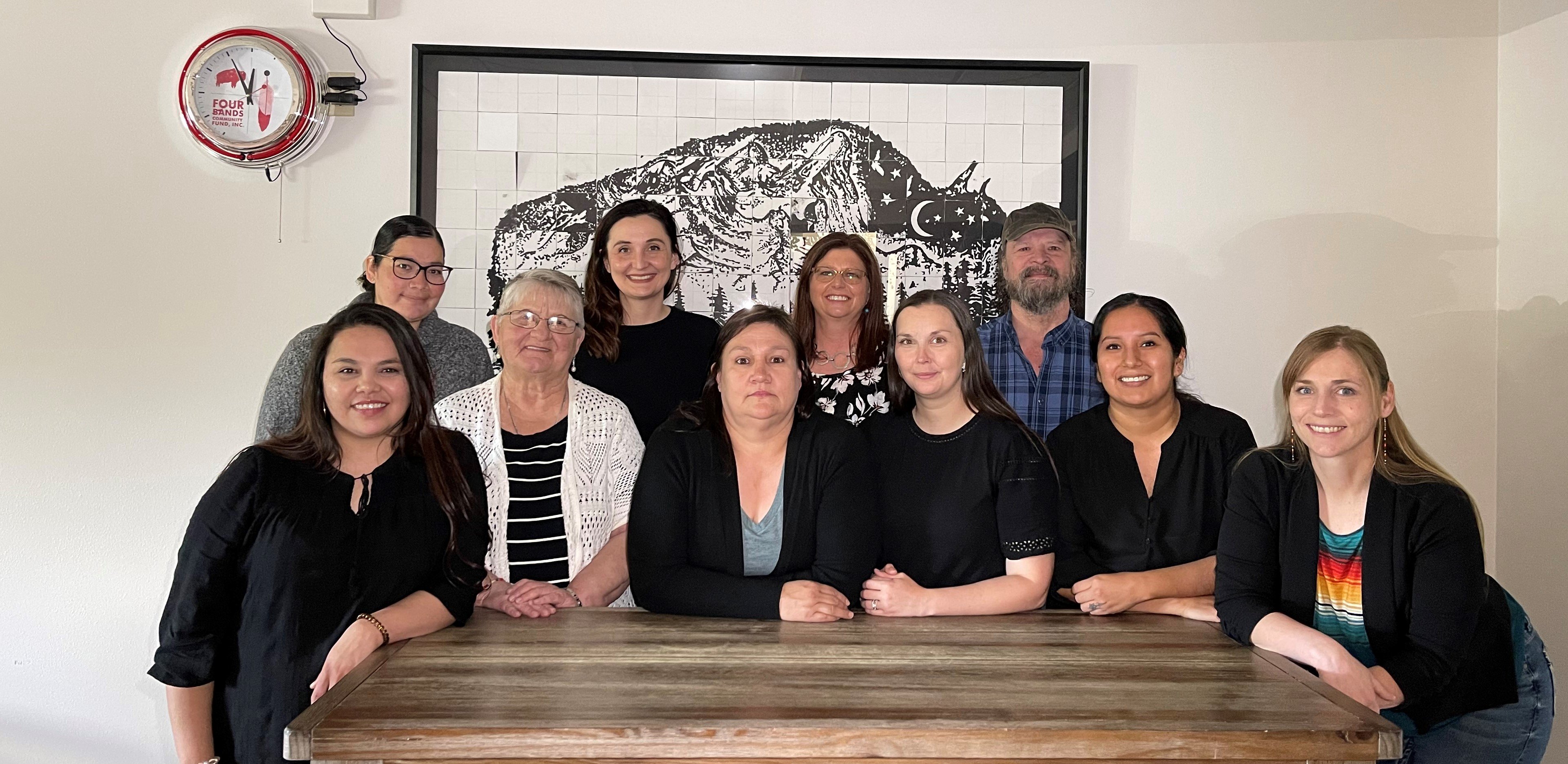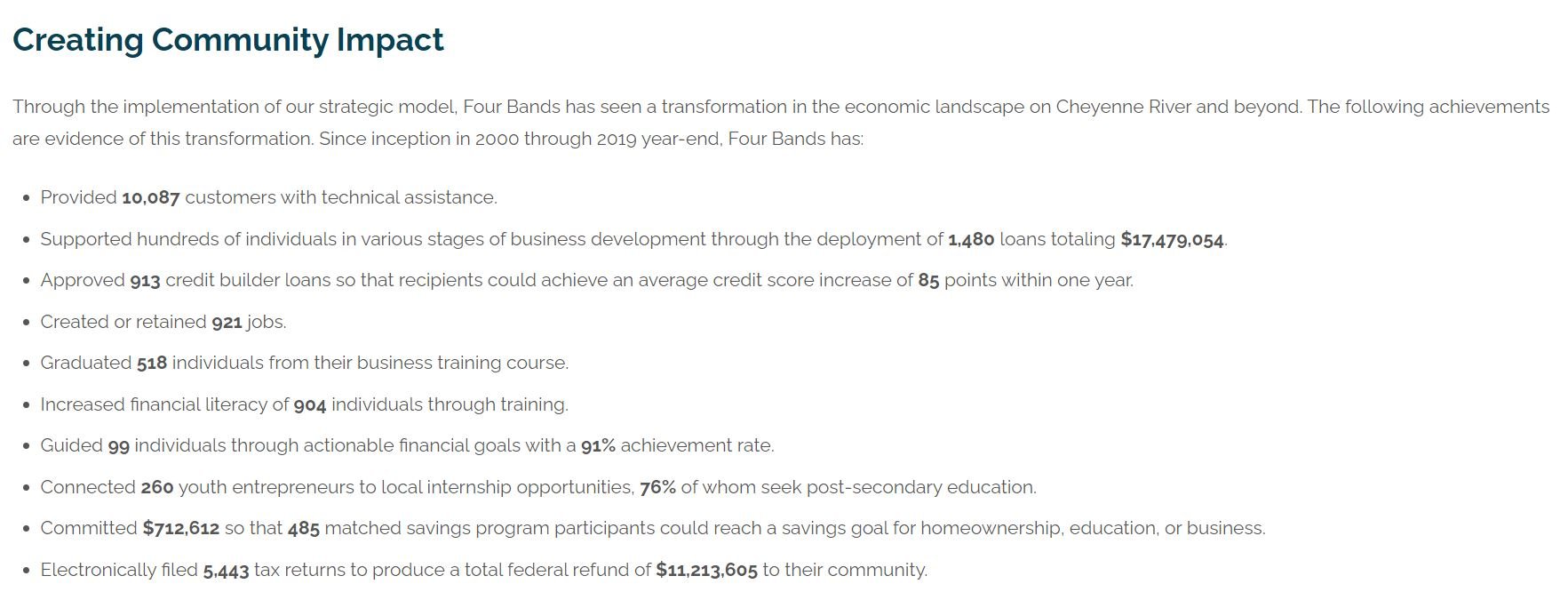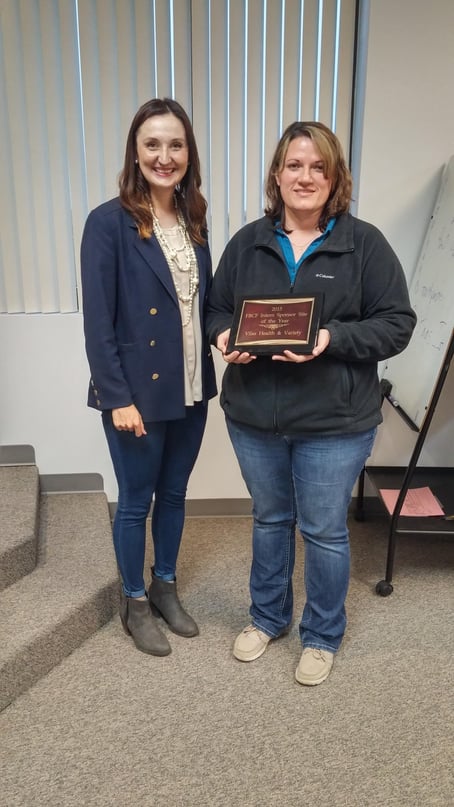Practical Activist Q&A: Lakota Vogel, Four Bands Community Fund
- Bluestone Staff
- December 17, 2021
Feature image: Lakota Vogel, Executive Director, Four Bands Community Fund
Lakota Vogel is the Executive Director at Four Bands Community Fund, a nonprofit organization that has emerged as a national voice in the Native American community and economic development movement. A leading organization on the Cheyenne River Sioux Reservation as well as in the state of South Dakota, Four Bands focuses on small business development, business lending, financial capability, and homeownership. Four Bands Community Fund is a community development financial institution (CDFI.)
Q: Talk about how your programs and services translate traditional Lakota values into practical applications for today’s “modern” economy.
A: We’ve been here for 20 years and the first five-ten years were about building trust in the community and speaking a common language. There was a lot of distrust of financial institutions or they were thought of primarily as depository institutions. So, we really had to work on language and how to use it and the grounding of the values and the mission of our organization. Holding onto those values is woven through everything we do. We’re constantly in a translation mode asking ourselves: what does the community hear and what does the funder hear? Knowing our audiences has really helped a lot.
We still get a lot of feedback from our elders about money. So, for example, in the Lakota language there is no word for money. The closest thing is mázaska which is iron and I believe that has a lot to do with the railroad system which is connected to where money flowed from. Currently, there is talk in the Nation about wealth, equity and wealth generation and wealth building. We are taking a pause on that as Four Bands because we don’t find a direct translation to wealth and we’ve been told by our elders that wealth is about circulation not accumulation. That’s been repeated to us many times.
So, how do I measure wealth with our clients? I think we need to redefine wealth and money for our community, for a market that was left out of the conversation for many, many years, and still largely is left out of the discussion. I don’t have a finance background. I have a Master’s in Social Work and I realize it’s about being in a space to listen to the community and hearing what the rest of the world is saying and then asking does that make sense in our community?
Image below: The Four Bands Team

Q: Four Bands celebrated 20 years just as the pandemic hit. What milestones of achievement served you well as you pivoted to serve your community and bring economic relief during that time?
A: The pandemic was unique and I don’t think there’s enough information about how it affected Indian Country, specifically Tribal Nations that are geographically land-based (like us). We have a tribal jurisdiction that we’re accountable to first and foremost, and our tribal jurisdiction had the authority to dictate what was going in our economy just like a state government. Then on top of that, we had a state government and a federal government. Our tribal government chose to err on the side of caution and protect the public health interest at the risk of losing business, so our businesses were shut for a longer period than many businesses across the nation. So, Four Bands was here and established and we were able to support our small businesses so no one failed because of COVID and that includes 105 small businesses across the state, and eighty percent of those were on the reservation.
In my ten-year track record at Four Bands, I’ve been witness to a redefining of sustainability from where we were told the definition is a certain formula, but really it’s the sustainability of an idea and the momentum and movement behind that idea. We’re serving a need in the community and we’re so nimble that we can change. The financial mindset change came when we no longer had to sell our community on the idea of financial capability and training. We started out with a strategy of investing in anchor institutions like our school systems, our Tribal nation and the hospitals where our employed populations are…that’s where we started to get the word out. The basics of understanding your budget, your credit score and here’s how we can help. Then, from there it trickled into the homes, and we even had a school program called Making Waves curriculum where we went into the school system because our population is 45% youth under the age of 18. And now, it’s about growing the finance side, and we’re getting demand for our services so we can look at solving the unmet need of native entrepreneurs across South Dakota.
Q: Four Bands developed an unprecedented partnership with the state tourism department. Tell us about that journey and the impact that it has had.
A: The state of South Dakota has a lot of tourism opportunities from historic sites to hiking and outdoor recreation. Often, Native Americans are treated like a historic site versus understanding a living culture that is here. As a CDFI, we saw that a lot of the tourism sectors were unsupported, so that meant partnering with the state agency working on doing the advertising and attracting people to South Dakota, putting out the guides that tell people where to go, etc. There is a new entity called the South Dakota Native Tourism Alliance which is being run by George Washington University. They got some federal funding to lead this effort so that all the nine tribes in South Dakota can be part of this Destination American tour so they map out where the bus goes and ensure that a tribe is set up to host a Destination America tour. The initial efforts showed the state that we’re here, and gave us a voice and the opportunity to find champions in Cheyenne River to be that point of contact for the state. What’s important is building up the businesses to support tourism like your hotel accommodations and restaurants. If you have lodging and no food, it doesn’t work very well, so that’s a big part of how we support the Native business community so that we can attract and sustain tourism. First, get people here, and then once they get here, ensure that they want to come back.
Q: Four Bands impact has been impressive. What shines the light on the future for you?
A: With many of the new opportunities coming from the federal government programs, we can’t even predict the future. We’re getting calls from other tribes in other parts of the state that want our help. There’s a lot of opportunity for us to leverage our 20 years of experience and support communities in building out stronger economies for them. None of this would be possible without the federal funds that are coming down the pike. Post COVID, we’re lending more than we’ve ever lent. Last year, we lent $3.9 million and this year, we’re looking at $5.5 million.  We're still undercapitalized and there is a demand out there to serve Native American entrepreneurs and no one else is servicing this market for many reasons. We can serve it! We just need more capital to do it, and it’s an exciting time for us because of the advocacy around the Black Lives Matter movement and the reciprocity there and what it has done to amplify the other voices in the community. It’s a great time to advocate for the capital access needs across our country.
We're still undercapitalized and there is a demand out there to serve Native American entrepreneurs and no one else is servicing this market for many reasons. We can serve it! We just need more capital to do it, and it’s an exciting time for us because of the advocacy around the Black Lives Matter movement and the reciprocity there and what it has done to amplify the other voices in the community. It’s a great time to advocate for the capital access needs across our country.
Q: From Secretary Deb Haaland to your own team at Four Bands, this seems to be a moment in history for Native American and First Nations women to help lead the way.
A: We’re a matrilineal society and a lot of the leadership around me is female – except when you get into government. Our tribal government is largely male, and I believe that’s because we adopted something called an “IRA” which is a government-related constitution. So, when the federal government originally obliterated tribes, they gave us a template constitution to adopt which was based on white male society. Overall, our tribal constitution is a cultural mismatch for my tribal nation. That being said, it’s exciting to have Native voices at the table right now, and I hope it continues and it’s not a one and done thing.
Q: What would you like people to understand the most about economic development needs and opportunities for Native Americans? Are there any myths you want to dispel?
A: There are many complexities when it comes to Tribal Nations, and it’s too bad that American history has left out so much of our history. The easiest analogy I have is thinking about the game Monopoly. If you arrive late to the table, all the best properties have been bought up and rules have been created that you don’t even know or understand. That’s where we are as Tribal Nations, our economies have been wiped off the board. If you think about the fact that the early 70s, was the first time that we were allowed to practice our own spirituality. Now, we’re on the board, and we’re ready to continue engaging in the economy. However, all the rules have been written, and the best properties have been bought up, and we’re trying to change that. The best way to do that is to rewrite the rules and create new loan products that fit our market. For example, one of the complexities is what’s called “Trust Land” where the federal government decided it would hold land “in trust” for Native Nations which impacts its ability to be collateralized as an asset. So, regular financial institutions literally can not see the largest asset that we have to leverage. They have no loan products that can work with trust land. And as Native CDFIs, we’re saying: “We can do it. We are doing it. Give us the capital.” We get the regulations are hard, but we can do it. There are many brilliant people in America, let’s just create a new product that fits 56 million acres of land in the United States. With the right people, we can figure this out.
 Photo right: Lakota and a Four Bands client
Photo right: Lakota and a Four Bands client
Q: What aspects of your background and experience have prepared you to lead Four Bands today?
A: We all stand on the shoulders of giants, and I appreciate all the levels of learning that I’ve had throughout my life ꟷ both the macro and micro levels of understanding. My first job out of college, I was a special education teacher through the Teach for America program. It took me home with my sociology degree. Working with students with disabilities, I am so grateful for everything that they taught me…how to think differently and to adapt to existing accommodations. That’s important to the way I work now. We don’t posit solutions. It’s about motivational interviewing and ensuring that the client across from me knows that they have the resources. It’s about asking the right questions so they can create the path to guide their own life whatever their goals are. In social work, I individualized in economic development and gerontology because I believe that if an elder can age well in a rural Native community, in their own home, then your community is set up right, so you’re not uprooting them from their home life and putting them in a home or a structure 100 miles away from their support system. I believe in that and by developing an economy where we can continue to support these small economies is important to help people age well in their communities.
In general, I want to always be curious. Curiosity is like a muscle. You have to continue to flex it and you have to keep asking why. A lot of us work within these institutions, but if we’re not continuing to ask why and is this serving us, we’re going to continue to have the same outcomes. Every day is new and every day is a new question.
Q: How does Icahya Woecun (the Place to Grow) inform your programs?
A: It’s been foundational to plant seeds of entrepreneurship first. Teaching people little bits of business principles so those seeds become the tree for community support. This is the place that people come to grow. It can be about personal finances and you know there’s a lot of shame about personal finances across America, so the first thing we try to do is remove the shame from it. That no matter where you are, you can come here and then it’s self-lead, treating people like whole, resourceful individuals so they lead the path that they’re going to grow on. We’re not pushing or yelling: Grow! We’re really providing a platform for healthy growth and the resources to nurture the soil so you can grow, but at your pace.
Q: Who or what inspires you?
A: My clients inspire me and the amount of change they can create in their lives when they have the resources that they need. I really like Malcolm Gladwell. He’s a great storyteller and I like his inquisitive mind and that he’s always asking questions. I have also been inspired by Don Miguel Ruiz’s The Four Agreements. They are: 1) Be impeccable with your word. 2) Don’t take anything personally. 3) Don’t make assumptions and 4) Always do your best. They guide me.
Q: Any guidance that you can provide on language when we’re talking about Native and Indigenous communities.
A: “American Indian” is the legal term from the federal government. From my perspective, “indigenous” captures the international community of colonized peoples. “First Nation” generally refers to native cultures in Canada. At Four Bands, we use “Native” and “Native American” for American populations as well as Native Alaskans and Native Hawaiians.
Through our Premiums with Purpose, Bluestone policies support nonprofits like Four Bands. Bluestone encourages the Practical Activist in all of us to get involved and support organizations like Four Bands that are creating solutions every day for a more just, equitable and vibrant future.
Like hearing about Practical Activists?
We’ll share their stories with you monthly. (No email overload… we promise!)


